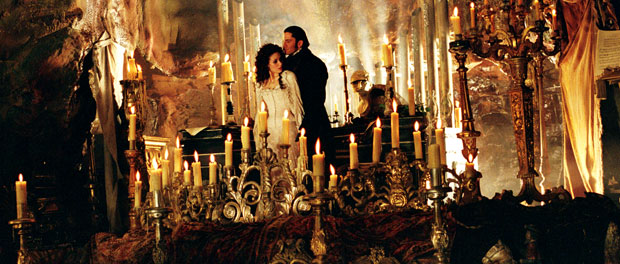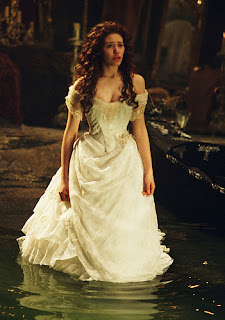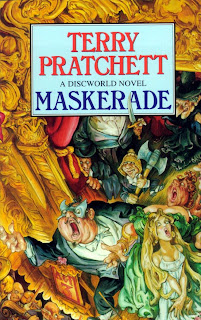I know enough musical theater people to have determined that
apparently The Phantom of the Opera
is revered, and excellent and really just the best!!! From my perspective,
however, the story’s always been a bit thin. Some very pretty but tragically
poor girl with a nice voice happens to be pursued by a suddenly rich old
boyfriend and an intensely creepy man who hides in the basement.
Said lovely young thing gets kidnapped by the creepy man,
for whom we are presumably to feel sorry, gains an epic case of Stockholm
Syndrome for the man who kidnapped her
and stalked her and threatened her with violence. Not weird
at all.
And then when the pretty girl runs off with the rather dull
but refreshingly not psychopathic rich boy, the audience is meant to mourn with
the creepy man. Because he’s the real victim here. The girl is clearly a
manipulative bitch who doesn’t know what she’s giving up, right?
Oh my head.
Like I said, I’ve never quite got the whole deal with Phantom. The songs are fabulous, and I
know that the story is based on the classic novel by Gaston Leroux, which is
slightly better than the stage version, but only slightly. Plus there was that
phenomenally awkward film that didn’t have a single properly cast actor in
sight (though Emmy Rossum has proved to be an excellent actress in Shameless, which we’ll talk about
someday). And of course there was that time that Andrew Lloyd Webber decided to
stop being subtle about his love of money and wrote a freaking sequel, but
still. Lovely music, right?
Now, I could here go into a long and detailed explanation of
why the plot of Phantom is wrong and
misogynistic and terrible, but really, I think at this point most of you can
fill in the details for yourselves. Instead, let’s talk about a version of this
story that wasn’t terrible. A version that actually made sense, made me laugh,
and happened to contain a fat lady singing.
Let’s talk about Terry Pratchett’s fabulous parody novel, Maskerade.
I have mentioned in the past my abiding ambition to read
everything that Mr. Pratchett so much as sneezed on, so this book is actually
part of my reading list. And boy was it a breath of fresh, perfectly pitched
air.
The plot of the novel, though following closely the plot of
the original Phantom, is mostly
concerned with Agnes Nitt, a girl with a great personality and lovely hair (aka
she’s fat), who flees from her mountain home in Lancre and goes to
Ankh-Morpork, changes her name to Perdita and joins the opera.
The opera is of course just settling in with a new owner,
and possessed of an increasingly homicidal Opera Ghost. Agnes, who has a
spectacular voice but a body more built for, well, opera, is relegated to the
chorus, but asked to sing the lead roles while Christine, a more traditionally
sized girl, mouths the words. And, for a time, it works.
Except, the Ghost is getting more menacing, and Agnes can’t
help sticking her nose into things.
There are a lot of things I actually really loved about the
setup to this story, not least of it being that it was a book about the Lancre
Witches, who have been my lifespiration for a while now. The witches, Granny
Weatherwax and Nanny Ogg have just lost their third (the maidenly Magrat) to a
royal marriage, and need to fill her space. They decide on Agnes as a natural
fit, but Agnes isn’t having any of it. It’s this that prompts her flight to the
city, and the witches’ pursuit is what really gets the plot going.
Plus there are stage swordfights, a swinging chandelier, and
a very disgruntled cat. Quite entertaining, and very well written.
The reason I bring it up in this context, though, is because
this is the rare case where the lead female character has been written to be
the exact opposite of the usual lead female character in these stories, and it works. Usually when someone sets
out to write a negative, they end up with a shady strange thing that doesn’t
make much sense. But Agnes makes sense. Far too much sense.
Constantly set as a foil against Christine, who behaves
precisely as a heroine is expected to behave, with lots of swooning and
exclamation marks, Agnes is determinedly practical. She sees there is a
problem, but she refuses to get all mucked up about it.
She knows she’s good at what she does, but she’s still
humble. And, better yet, she has internal struggles about the line between
humble and doormat, even going so far as to stand up for herself once in a
while, and have it go horribly wrong. I like her because she’s unusual. I love
her because she’s flawed.
Really, when it comes down to a critique of the original Phantom and its original heroine, this
is where the story fails. Christine has so little of a personality, that there isn’t
room for flaws. It’s a story written about the doings of men, where women are
just chess pieces being passed back and forth. Christine has no more agency
than the props being carried on and off stage, and tends to get left in worse
places.
By contrast, Agnes is a fully realized person. She’s not
always a nice person, and she’s not always a person happy about how fully
realized she is. And I like that.
You can get far further with a female character who’s flawed
and interesting than one who’s beautiful and empty. It’s what makes Maskerade a genuinely enjoyable book,
and what makes The Phantom of the Opera
so dang hard to get through.
Also, witches.
 |
| Seriously though. Gerard Butler? Are you insane, casting directors? |




No comments:
Post a Comment